Key takeaways:
- Whistleblower protections foster a culture of transparency and accountability, allowing employees to report wrongdoing without fear of retaliation.
- Recent legal changes have expanded whistleblower definitions, enhanced confidentiality, and imposed stronger penalties for retaliation, empowering more individuals to come forward.
- Supporting employees who report misconduct contributes to a healthier workplace culture, promoting trust and open dialogue between staff and management.
- For employees facing retaliation, documenting incidents, seeking support from peers, and exploring legal options are crucial steps for protection and recovery.
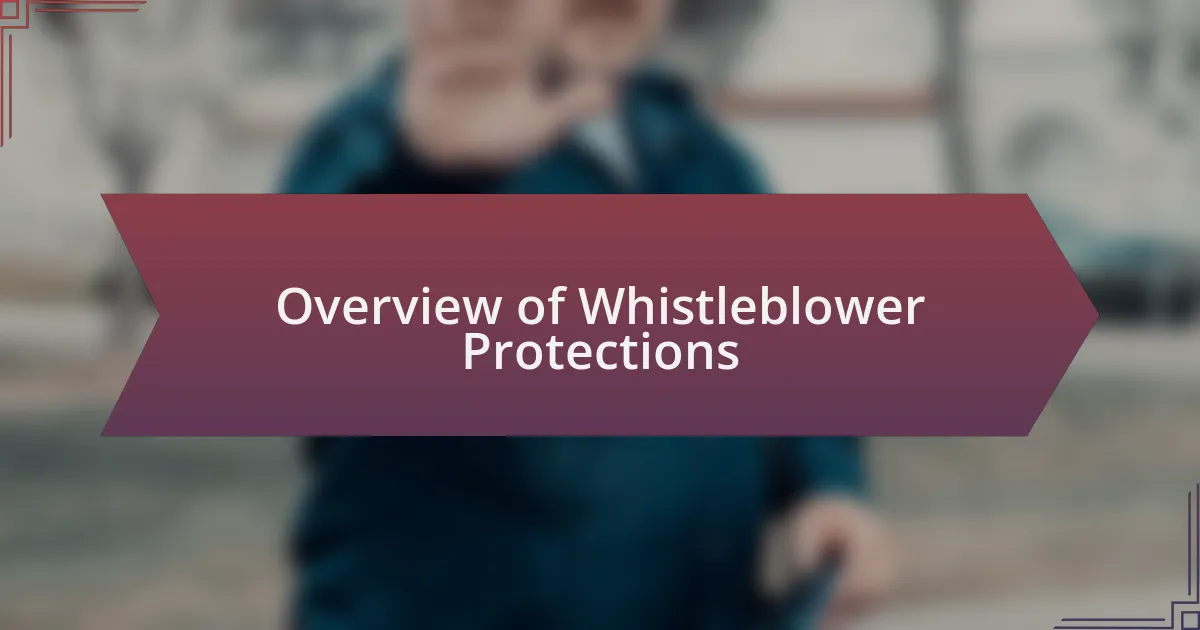
Overview of Whistleblower Protections
Whistleblower protections are designed to safeguard employees who report wrongdoing or illegal activities within their organizations. This legal shield encourages transparency and accountability, creating an environment where employees can voice concerns without fearing retaliation. I often wonder, without these protections, how many crucial issues would go unreported, allowing unethical behavior to fester unchecked?
Through my experience, I’ve seen how these protections can empower individuals. For instance, a colleague once shared how reporting safety violations at their workplace transformed their company’s culture. It took immense courage for them to speak up, yet the positive change not only protected employees but also improved overall morale. This illustrates the vital role protections play in not just safeguarding whistleblowers but in fostering a healthier workplace for all.
Additionally, it’s important to note that whistleblower laws vary greatly by jurisdiction, with some being more robust than others. I’ve encountered situations where some employees felt uncertain about their rights because the laws weren’t clearly defined. This inconsistency can ultimately discourage potential whistleblowers, raising the question: How can we ensure that all employees feel protected and informed about their rights?
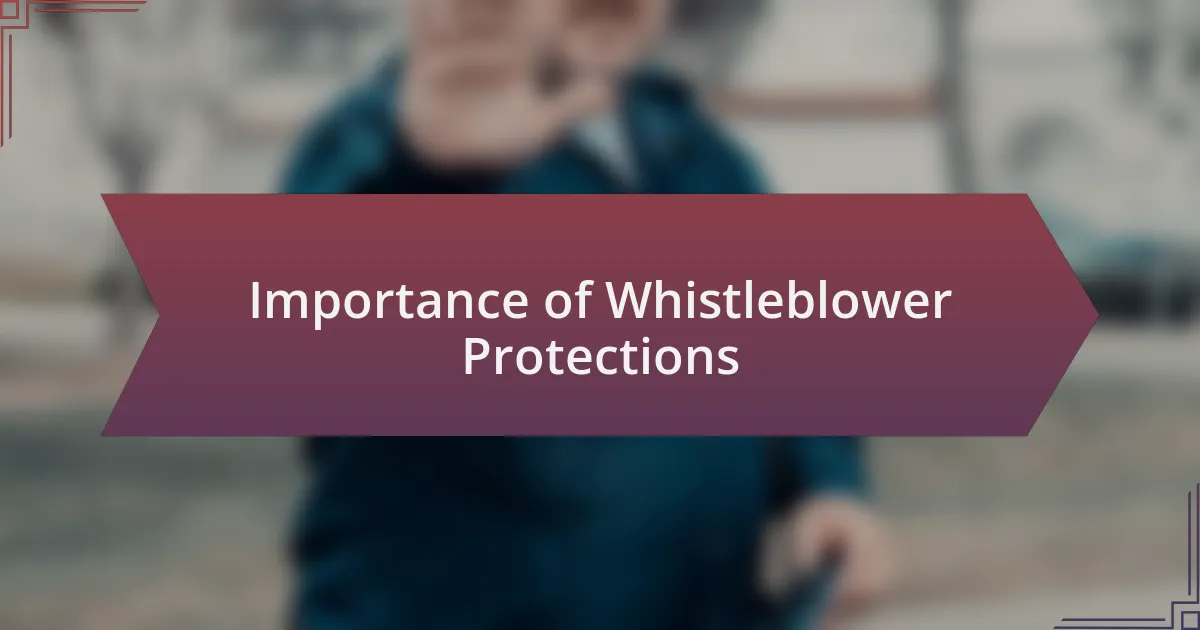
Importance of Whistleblower Protections
Whistleblower protections are crucial for cultivating an open dialogue within organizations. I recall when a friend of mine hesitated to report misconduct at her firm because she feared backlash. When she finally mustered the courage, the protective framework in place not only safeguarded her from retaliation but also highlighted the company’s commitment to ethical behavior, igniting a larger conversation about integrity.
Moreover, these protections serve as a deterrent against unethical practices. I remember a time when a major retailer faced scrutiny after a whistleblower came forward with evidence of fraud. The ensuing investigation led to significant changes in policy and procedures, demonstrating how protecting whistleblowers can lead to systemic improvements. Isn’t it fascinating how one person’s voice can ripple through an organization, prompting action and accountability?
On a personal level, I find it deeply fulfilling to witness the ripple effects of solid whistleblower protections. When individuals feel empowered to speak up, it creates a culture of trust and accountability. Have you ever thought about the implications for workplaces that lack such safeguards? It’s a sobering thought that without these protections, many employees might remain silent, allowing unethical practices to persist unchecked.

Recent Changes in Employment Law
Recent adjustments to whistleblower protections spotlight the evolving landscape of employment law. Just last year, I learned about new federal legislation that significantly broadened the definitions of who qualifies as a whistleblower. This change means more employees in diverse workplaces can now report misconduct without fearing repercussions, which seems like a step in the right direction, doesn’t it?
Furthermore, states have started to enhance their local laws to align with these federal initiatives. I recall reading about a state that recently implemented additional training programs for employers, aimed at raising awareness about whistleblower rights. Such proactive measures not only empower employees but also encourage a more ethical corporate culture. It makes me wonder how many organizations will actively embrace these changes rather than just comply minimally.
On a personal note, I find it inspiring to see how these changes resonate within organizations. Knowing that the law now offers a more expansive view on whistleblower protections gives me hope for employees who might otherwise remain silent. Have you ever considered the courage it takes for someone to speak out? These legal updates aim to remove barriers and foster an environment where integrity is not only valued but also protected.
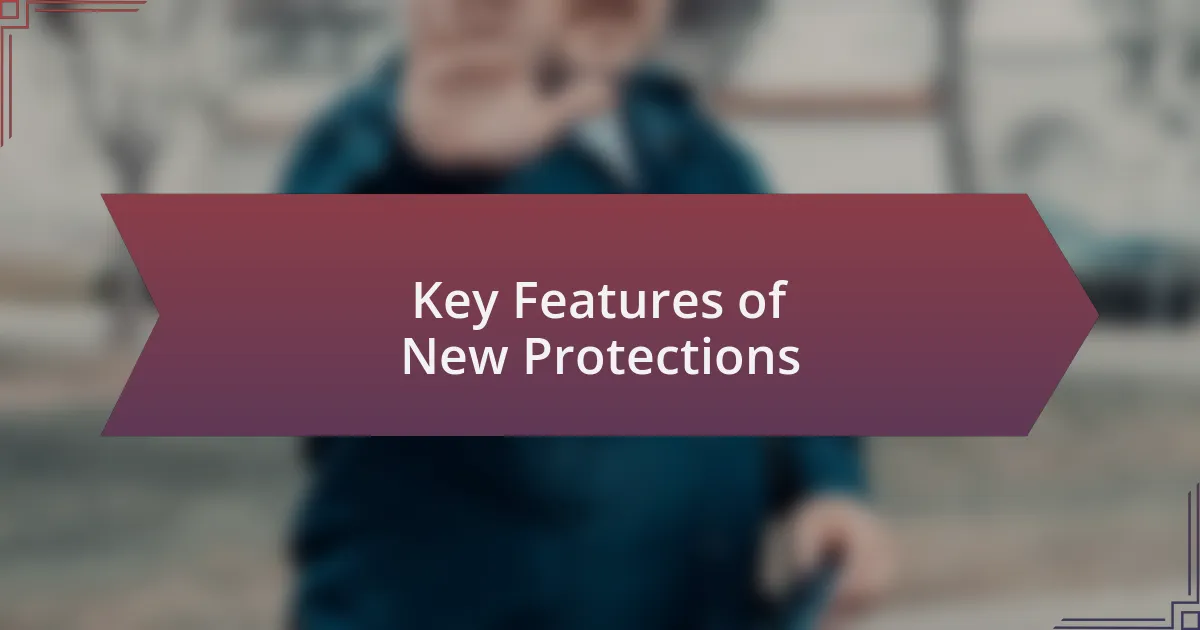
Key Features of New Protections
One of the key features of the new whistleblower protections is the expanded definition of what constitutes unlawful activity. I remember a time when a friend hesitated to report a case of financial misconduct at her workplace because she wasn’t sure if it fell within the strict legal definitions. With the updated regulations, there’s now a clearer and more inclusive guideline, which empowers more individuals to come forward without the dread of ambiguity hanging over them.
Moreover, the legislation guarantees increased confidentiality for whistleblowers. In my experience, confidentiality can be a game-changer in these scenarios. Just last month, I spoke with a former employee who felt free to voice workplace concerns only after learning about the assurance of anonymity provided by these new laws. Knowing that their identity is safeguarded helps individuals speak out, knowing that they won’t face backlash from colleagues or management.
Lastly, the new protections introduce stronger penalties for retaliation against whistleblowers. This measure provides a much-needed deterrent for any employer who might consider punishing an employee for doing the right thing. A friend once faced retaliation after reporting unsafe working conditions, and reflecting on that experience, I can’t help but feel relieved that future whistleblowers will have this safety net. How much confidence would you have to reveal unethical practices if you knew your employer would think twice before retaliating?
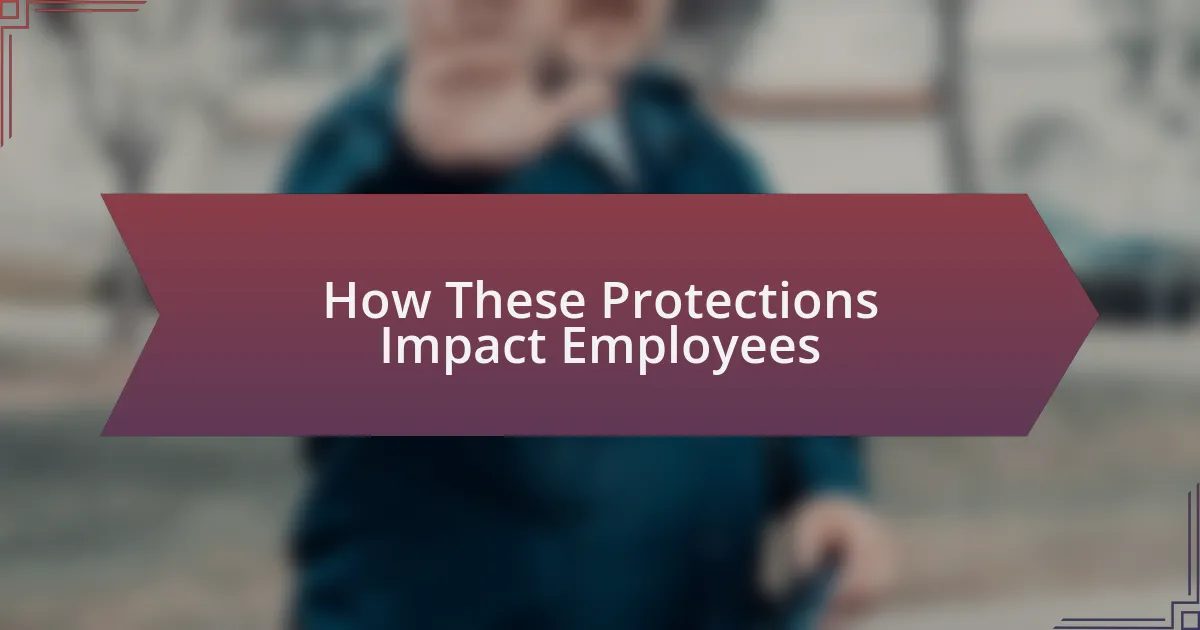
How These Protections Impact Employees
The new whistleblower protections significantly impact employees by fostering a culture where they feel empowered to report misconduct. I remember a time at my workplace when a colleague discovered fraudulent activities but remained silent out of fear of losing their job. Now, with these enhanced protections, employees can raise their voices knowing there are stronger safeguards in place against retaliation, encouraging a more ethical workplace.
In my observations, many employees become more vigilant when they know they have support in reporting wrongdoing. Just recently, I spoke with a co-worker who expressed relief at the thought of being able to report unethical behavior without worrying about personal consequences. Doesn’t it feel reassuring to know that the legal framework is shifting to support individuals striving to uphold integrity at work?
These protections also contribute to a greater sense of trust among employees and management. When workers believe that their concerns will be taken seriously and that there’s a system to protect them, they are more likely to engage openly in discussions about workplace challenges. I once worked in an environment where fear stifled communication; the new regulations can help break that cycle, leading to healthier, more transparent workplaces. How transformative would it be if every employee felt safe speaking up?
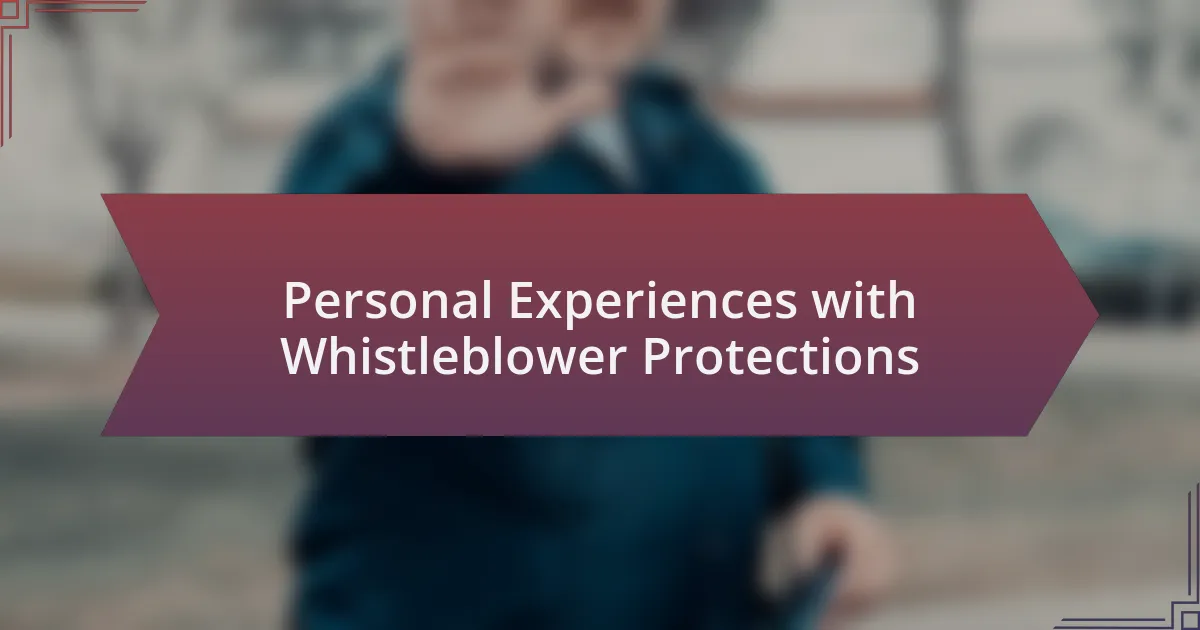
Personal Experiences with Whistleblower Protections
Reflecting on my own experience, I recall a situation where a friend faced harassment at work. Initially, she felt trapped and alone, unsure if reporting the behavior would cost her the job she desperately needed. With the implementation of new whistleblower protections, she finally mustered the courage to speak up, reassured by the knowledge that she’d be shielded from retaliation. Doesn’t it strike you how pivotal these changes can be for someone in a vulnerable position?
During a recent discussion with a fellow employee, I learned about a case where someone blew the whistle on unsafe working conditions. Knowing that they could rely on legal protections made all the difference. It was as if a weight had been lifted off their shoulders; they talked about a newfound sense of safety and community. Isn’t it remarkable how such frameworks can create a ripple effect of empowerment among coworkers?
In another instance, I remember participating in a training on our company’s whistleblower policy. The facilitator shared testimonials from past employees who benefited from these protections. Hearing their stories sparked a collective realization within the group: if we don’t protect those who speak up, we hinder the very fabric of our organization. It’s a poignant reminder that each of us plays a role in fostering a culture that values transparency and ethical behavior. How important is it, then, to champion an environment where everyone can voice concerns without fear?
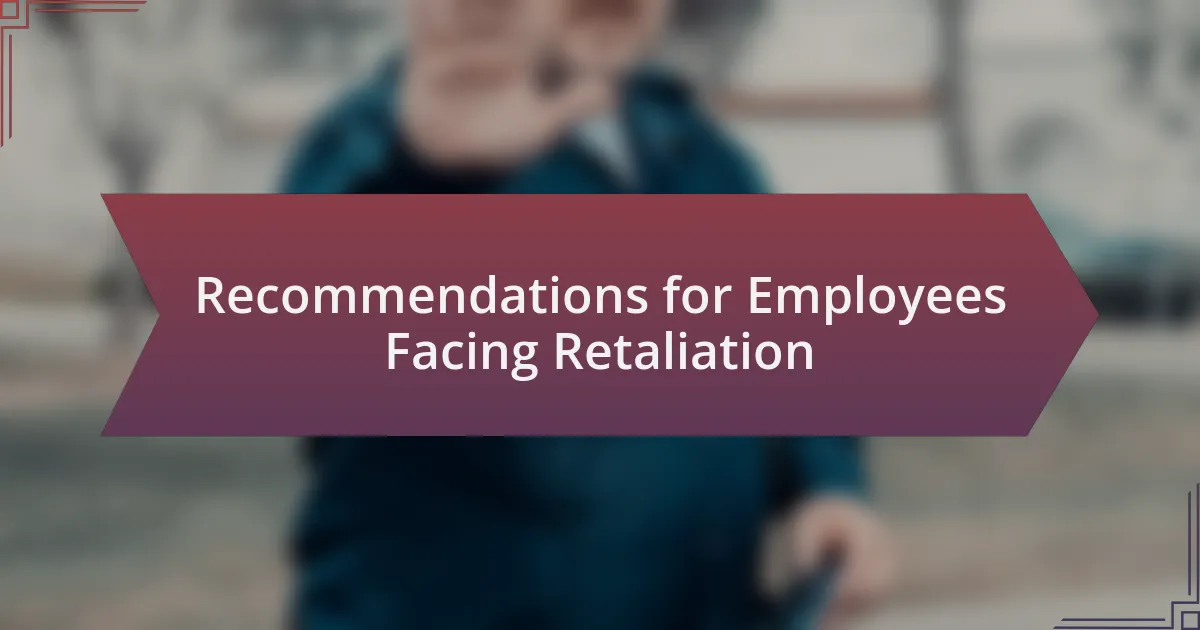
Recommendations for Employees Facing Retaliation
When facing retaliation, the first step I strongly recommend is documenting everything. I remember a time when a colleague faced subtle forms of harassment after reporting an unethical practice. They started keeping detailed notes of incidents, conversations, and any retaliatory actions. This record became crucial later on when pursuing their complaint. Isn’t it empowering to have solid evidence at your fingertips?
Next, seeking support from trusted coworkers or mentors can make a significant difference. I once witnessed another friend lean on her network after she reported a misconduct incident, and that connection provided her with strength and reassurance. I think about how validating and motivating it can be when you know others understand your struggle. Don’t underestimate the power of solidarity.
Finally, exploring available legal avenues can be vital. I recall a situation where an acquaintance turned to an employment lawyer for guidance after experiencing retaliation. They were amazed at how many resources existed to protect them. It’s comforting to know that there are professionals who specialize in helping individuals navigate these challenging circumstances, right? In moments of doubt, accessing expert advice can provide clarity and confidence to take the next steps.